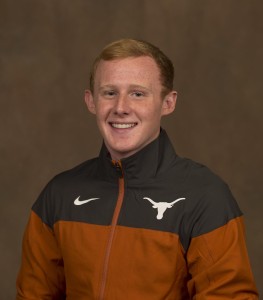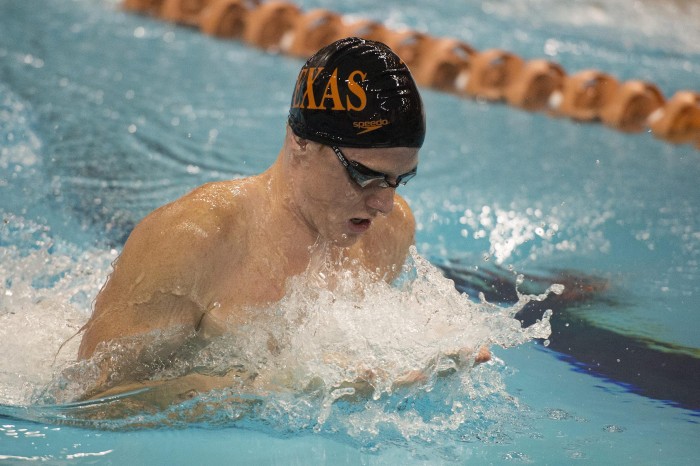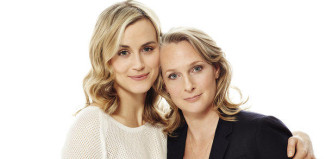As a junior, Matt Korman won the 2013 Big 12 Conference championship in the 200-yard breaststroke, but that may not be the Houston native’s biggest accomplishment.

Photo via Matt Korman
In November 2013, he wrote a coming-out email to his Longhorn teammates. The story was picked up first by Outsports.com and then other major websites, and the business and communications major dived into the leadership pool of LGBT college athletes. In the last year, he has become an administrator of a Facebook group called Students Producing Allied Community Equality (S.P.A.C.E.), participates in monthly conference calls with GO! (Generation Out) Athletes, and counsels other athletes in the process of coming out.
Now after 12 years in the pool and in his last year of competition before graduation, Korman is busy training for the last few swim meets of his career, leading up to the Big 12 Championships Feb. 25-28 at UT’s Lee and Joe Jamail Texas Swimming Center and the NCAA Championships March 26-28 in Iowa City, Iowa.
It’s been just over a year since you came out to your teammates. How different is your life since then?
My whole life has changed. When I finally came out to my teammates, it changed the way I interact with them, my coaches, my parents, my friends. I was able to more fully invest in the things I wanted to do. I felt more enthusiastic about academics and swimming. My grades improved. My swimming times got faster. But I think the biggest change for me is being honest with myself and growing as a person. When you’re in the closet, you hide who you really are and build a façade around this character you want people to perceive you as. I hid behind that for a very, very long time.
“Visibility and a dialogue are the most important things at the moment in the LGBT sports community. We’re just like everyone else.”
What gave you the courage to send the email?
Probably a combination of the confidence I had built up from telling my mother and my best friend. There was an eight-month period between telling my mom and telling my teammates. I would go home and be myself and feel how wonderful that was, and then I would have to come to the pool, where I spend six hours a day and be someone I’m not. That role-switching is exhausting, and I couldn’t keep it up any more. So one afternoon I drafted an email. It just flowed on to the keyboard. You have to finally take that leap of faith, even if that feels like you’re walking on the edge of a cliff.
How was it coming out to your mom?
She’s my rock. I was raised in a single-parent home. My mom drove me to practice twice a day. She was at every single meet and has been my biggest supporter from day one. Driving up to her house, I was absolutely terrified. It sounds so simple, stringing three words together: I am gay. But it’s the hardest thing to do. We were outside on our patio having a casual conversation. Then the question came up, “Are you seeing anyone?”
“Well, yes, I am, as a matter of fact.”
“What’s her name?”
“Well, he’s a guy. Mom, I’m gay.”
She just started crying. I couldn’t read her initially, and I thought it was about to go really south. Then she looked up and smiled and said, “I love you. I am so happy for you that you found the courage within yourself to say something and to be who you are.”
Driving home, I could not stop smiling. That feeling is so contagious. Every time I would tell someone, it was a snowball effect. Over the months I would keep telling people, and I would feel more confident in myself. It was the best day of my life. That’s why it’s tattooed on me.
 Tell me about the tattoo.
Tell me about the tattoo.
The date on my side is March 17, 2013, which is the day I came out to my mom. I always knew I wanted a tattoo, but I had never found anything significant. So I said if anything ever comes to me, it will happen. And sure enough, there it was. I designed it myself. I like the tribal, geometric arrow shape. To me it signifies always moving forward, always reaching out to something better.
Several other athletes have come out recently: Australian swimming great Ian Thorpe, Jason Collins, Michael Sam, several college athletes. Did you reach out to any of them, or did they reach out to you?
When I was in the closet, I reached out to gay athletes and people who were in the closet who I knew were gay for advice, and I’ve had a lot of college athletes reach out to me. Fellow out swimmers, baseball players and football players congratulated me throughout the year, and GO! Athletes have a conference call every month where we catch up. Whenever someone else comes out, we make sure they are aware of the support group.
I’ve had several athletes tell me my story has inspired them to come out. If I can help someone have a positive coming-out experience, that enriches my life so much. We’re trying to create that kind of opportunity with S.P.A.C.E., where people can come if they have questions or concerns. Lauren Neidigh, an out swimmer for the University of Arizona, and I are working on the project, trying to get an open dialogue on college campuses so people will know there are not only gay people who support the community but straight people and people who identify as different genders.
How did you get involved in S.P.A.C.E.?
Lauren came up with the idea. It’s a Facebook group, and she knew I’m very into social media, so she approached me. We want to create a community, because we know how hard it was for us to come out, especially in the swimming community. You’re barely wearing any clothes, and it can be kind of weird, so we wanted to help other people with their coming-out process.

Photo via Matt Korman
I wondered about the LGBT attitude in swimming. On one hand, in my experience, swimmers seem to be less inhibited—and more confident in their bodies and sexuality in general—than athletes in other sports. But, as you mentioned, the uniforms are pretty small.
It is loose compared to sports such as baseball and football, where everything is masculinized every five seconds. But there is still that hesitancy with minimal clothing. Some people just aren’t educated that we don’t want to jump into people’s pants every five seconds, so the Speedo thing can be uncomfortable.
What advice do you give others when they ask about their coming-out process?
It is such a personal experience and journey. When people approach me about it, I always ask, “Are you ready?” because it is such a huge, huge step. If they say yes, I’ll ask about factors, such as timing and their parents and teammates. It’s a very big decision, but it’s also a very gratifying and worthy experience. If I were to give one sentiment of advice, it would be to have courage. You have to dig really deep inside yourself and just say the words. But once you say it, it’s the best feeling in the world.
Have you experienced any negative reactions?
I haven’t met much backlash at all. It was rocky with my dad at first, but it ended up being all right. I knew it would be very difficult for him to accept, because he is very religious. I didn’t think it (my coming out) would spread like wildfire. I guess in my naiveté I thought it would just stay on Outsports and my dad would never see it. Little did I know that my father’s home page is Yahoo, and he discovered that his son was gay via his home page. He wasn’t as upset at the fact that I was gay as he was that we didn’t have a strong enough relationship for me to tell him. We’re still getting there, but I’m glad I have an open dialogue with him.
It’s just a process, as with some guys on the team. It can be uncomfortable for some people, but it’s important to have that dialogue. Visibility and a dialogue are the most important things at the moment in the LGBT sports community. We’re just like everyone else.
Have you always been a leader in dialogue? It’s remarkable that you can take that stance.
I feel like I got that from debate in high school. There is an event called oratory, a 10-minute memorized speech you present to an anonymous group. I would speak on being gay and feel so liberated. You take a chance, and taking a chance over and over throughout the four years definitely built confidence. Having to argue and persuade people and using those tactics really influenced the way I talk to people. Educating people is the most important part.
Do you hope to continue swimming competitively after you graduate?
I am going to be done after NCAAs. It’s time. I have loved swimming. It has been my life, and I am so blessed to have fallen upon it. I’ve loved all of the relationships and the qualities and values it has instilled in me. But I’m ready to start a career and explore other aspects of life.
What kind of career are you seeking?
I want to go into the marketing or tech consulting field. I do a lot of graphics and coding work on the side, and I’ve found I have a real passion for that.
Interview by Jana Hunter





































